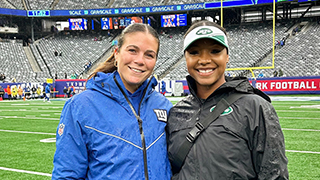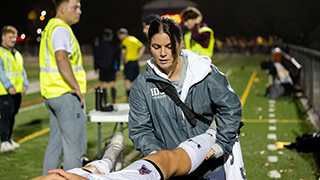Athletic Training Students Build Professional Skills in the Field
Friday, May 2, 2025

(L–R) M.S. ’24 graduates Claire Ralston and Nia Muckle worked with the Giants and Jets, respectively, while M.S.A.T. students.
Seton Hall’s Master of Science in Athletic Training (M.S.A.T.) is a fast-paced, two-year professional degree program that prepares students to become certified athletic trainers at the high school, college and professional sports levels.
Clinical training — a central part of the program’s success — offers students insight into the many career paths available in athletic training, while helping them develop strong professional skills.
First-year students begin clinical rotations in the fall semester — an early start that’s a hallmark of the Seton Hall M.S.A.T. program, the state’s first accredited entry-level master’s program in athletic training. Clinical experiences (also called fieldwork) provide students with on-site training at rehabilitation centers, hospitals and high school and collegiate sports teams — offering comprehensive training and professional confidence by graduation.
The program’s dedicated clinical supervisor and extensive network of on-site partnerships make it possible for Seton Hall students to complete a variety of fieldwork opportunities prior to graduation, noted Vicci Hill-Lombardi, chair of the Department of Athletic Training.
“During the first summer class, we assess each student’s clinical skills to determine the level of supervision and mentorship they will need to progress,” Lombardi said. The program ensures that M.S.A.T. students’ clinical experiences expose them to patients of all ages, backgrounds and sports levels, to meet the standards established by the Commission on Accreditation of Athletic Training Education (CAATE).
“With more than 50 clinical sites and 80 preceptors, Seton Hall’s M.S.A.T. students have many options to meet their personal goals and grow into the athletic training professional they want to be,” Lombardi said. “We have such a variety of clinical experiences, as well as many alumni who are still very active with our program.”
Second-year M.S.A.T. student Trevor Holmes recently completed an 18-week clinical rotation with Rutgers University’s football program. Holmes, who gained fieldwork experience at Westfield High School and Fairleigh Dickinson University during his first year, noted that Rutgers’ clinical placement application process was more involved due to its NCAA Division I status, but worth the effort.
“Being at Rutgers for my clinical assignment has been an amazing experience,” he said. “Observing the sports medicine staff and the daily operations of such a massive organization has truly been eye-opening.” He added that working with a professional sports medicine team early in his athletic training career exposed him to advanced rehabilitation techniques and therapies, which strengthened his skills.

Claire Ralston, M.S. ’24, now an athletic trainer at Stevens Institute of Technology.
Claire Ralston, M.S.’24, who recently became an assistant athletic trainer at Stevens Institute of Technology, said her clinical experiences were her favorite part of Seton Hall’s M.S.A.T. curriculum because she gradually built up her professional skills and transformed her post-graduate career goals in the process.
“I began my first clinical rotation at Fairleigh Dickinson University, where I got to work on my taping and evaluation skills. I then went to West Orange High School, where I got to test my knowledge in those areas and function more independently,” Ralston said.
During her second-year clinical rotation with the New York Giants, she learned about rehabilitation and return-to-play protocols. She noted that her final clinical rotation, with Rutgers University’s gymnastics team, “helped me to prepare to be on my own as an athletic trainer.”
Ralston was surprised by her experience at FDU. “I did not expect to like the Division III setting as much as I did,” she said. “Before starting at Seton Hall, I thought I only wanted to work in Division I athletics or at the professional level, but my clinical experience at FDU changed that for me. I loved working with those athletes and being involved in collegiate-level athletics.”
After graduating in May 2024, Ralston worked as an athletic trainer at Vanderbilt University. She is now an assistant athletic trainer at Stevens Institute of Technology. Seton Hall proudly counts Ralston among the growing network of M.S.A.T. alumni making an impact in the field.
About the Seton Hall M.S.A.T.
Seton Hall’s Master of Science in Athletic Training is a two-year, 64-credit professional
degree that prepares graduates to become licensed athletic trainers — a career projected
to grow by 14 percent over the next decade. This entry-level master’s program received
accreditation in 2003, becoming New Jersey’s first CAATE-accredited master’s program
in athletic training.
Seton Hall’s cutting-edge facilities, distinguished faculty and robust clinical network set the M.S.A.T. program apart. Alumni work for NCAA sports teams, professional sports organizations including the Cleveland Browns, Cirque du Soleil, the U.S. military and a range of hospitals, healthcare and corporate settings nationwide. Learn more here.
Categories: Athletics, Education






